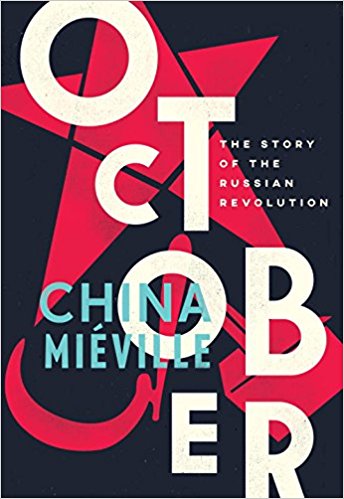 I have a small confession to make: I have never been able to get into China Mieville’s fiction. This is very embarrassing to me since his books look like they would be right up my alley. However, for some reason I have never been able to finish one. Then I saw October, a non-fiction account of the Russian Revolution, and I thought “I can totally read that!” I did and it was fantastic! Or at least as fantastic as a book about a calamitous series of events that led to countless deaths and untold suffering can be.
I have a small confession to make: I have never been able to get into China Mieville’s fiction. This is very embarrassing to me since his books look like they would be right up my alley. However, for some reason I have never been able to finish one. Then I saw October, a non-fiction account of the Russian Revolution, and I thought “I can totally read that!” I did and it was fantastic! Or at least as fantastic as a book about a calamitous series of events that led to countless deaths and untold suffering can be.
One of the hardest problems for anyone writing about the Russian Revolution is not reading the future back into the past. The author knows how the revolution turned out: famine, purges, labor camps, etc. It’s tempting to write that sense of doom and hopelessness into the events of January to October 1917. Mieville manages it very well. You get a sense of the full range of emotions of the participants from anger and rage to hopefulness and joy. In the end you are as surprised as them that it turns to tragedy.
You also get a sense of how the Bolsheviks were in many cases not the drivers of the revolution. Time after time, from the February revolution to the October Revolution, the masses acted without the input of the Bolsheviks, and in many cases the Bolsheviks had a hard time deciding what they wanted to do.
The narrative of this book is excellent, as you would expect from an award-winning fiction writer. It is easy to get lost in all the ever-evolving political parties of early 20th century Russia, but he does a very good job of not letting the story get bogged down in it. This is a very personal account of the revolution. Yes, the big names Lenin, Trotsky, Stalin, etc are all there, but so are factory workers, soldiers and naval personnel who had an equally large stake in the revolution. One downside to Mielville’s account is that it is very Saint Petersburgcentric. This is partly because Saint Petersburg (aka Petrograd aka Leningrad) was the political capital and thus where most of the political action took place, but its easy to forget that the revolution happened across Russia.
We are in the middle of the Hundred Year anniversary of the Russian Revolution so if you are looking for a book to read that doesn’t require you to be a specialist in early 20th century Russia this is the one for you.


